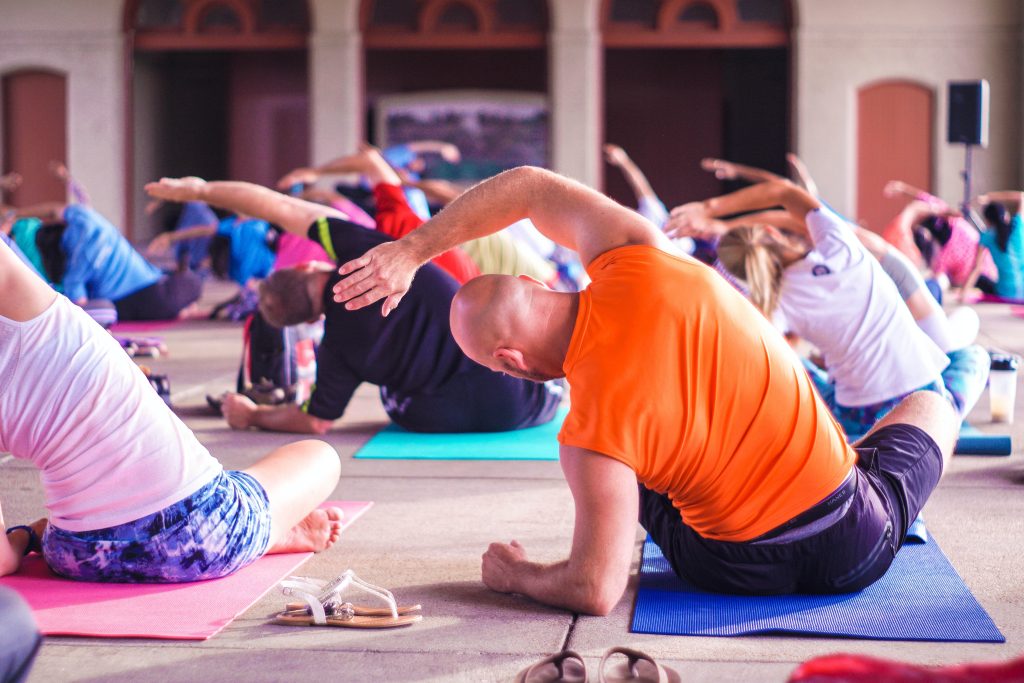Starting a fitness regimen involves not just physical preparation but also mental readiness, particularly crucial for beginners. Mental fitness, a critical yet often overlooked component of overall health, equips beginners with the necessary tools to confront the initial challenges of a fitness routine effectively. It encompasses the development of a mindset fortified with resilience, enabling individuals to manage stress, maintain positivity, and stay committed to their fitness goals.
Physical strength and endurance are widely acknowledged as key elements of fitness. However, the significance of mental strength and resilience is equally paramount. These mental qualities are essential, providing the perseverance required to commence and persist in a fitness regimen, even when facing obstacles.
Interesting Fact: Did you know that mental resilience not only aids in fitness endeavors but also significantly improves the ability to manage daily life stressors, enhancing overall life satisfaction?
This guide is designed to offer fitness beginners a comprehensive understanding of mental fitness and its importance.
Main Topics Covered in the Guide:
- Understanding Mental Fitness: Discover the foundational role of mental fitness in your fitness journey.
- Building a Resilient Mindset: Learn to cultivate resilience, your steadfast companion in overcoming fitness challenges.
- Stress Management in Fitness: Master stress management techniques to elevate your fitness regimen.
- Mindfulness and Cognitive Resilience: Explore how mindfulness fortifies cognitive resilience, crucial for sustained focus and clarity.
- Goal Setting and Mental Endurance: Set and pursue goals with unwavering mental endurance, transforming aspirations into achievements.
The guide details mental fitness and its critical role in starting and maintaining a fitness journey. It underscores the significance of developing a resilient mindset, managing stress efficiently, and utilizing mindfulness practices to enhance cognitive resilience. Furthermore, it addresses the importance of setting realistic goals and building mental endurance to consistently pursue these objectives.
Mental fitness is a vital component of any fitness journey, especially for beginners. This guide aims to equip you with the knowledge and strategies to develop mental strength, manage stress, practice mindfulness, set achievable goals, and build mental endurance. By embracing these principles, you are not just preparing your body for the challenges of a fitness regimen but also fortifying your mind and spirit for a comprehensive and enduring transformation.
Understanding Mental Fitness
Understanding mental fitness is crucial for initiating and maintaining an effective fitness regimen. It involves more than physical capability; it requires the development of a mindset equipped to handle the demands and potential stressors of a fitness routine. This section explores the components of mental fitness, emphasizes its significance for fitness beginners, and offers strategies to navigate early mental challenges commonly encountered at the onset of a fitness routine.
Defining Mental Fitness
Mental fitness refers to the capacity to handle life’s challenges with a positive mindset. It involves cognitive resilience—the ability to process and react to information efficiently—and emotional strength—the capability to navigate emotional challenges effectively. Cognitive resilience is critical for maintaining concentration and mental agility, especially under stress. Emotional strength is about managing and processing emotions, allowing for a balanced and proactive approach to personal and fitness-related challenges.
For individuals starting their fitness journey, mental fitness is a crucial component. It supports physical training and performance and contributes to a fulfilling and sustainable fitness journey. Integrating mental health awareness into fitness routines can enhance performance and overall satisfaction.
Importance for Beginners
For beginners, recognizing the importance of mental fitness is as vital as understanding the need for physical endurance and strength. Newcomers often face challenges such as setting unrealistic goals or struggling with motivation. Mental fitness is key in these scenarios, providing the mental endurance required to continue. It fosters a resilient and positive mindset, essential for navigating the initial phase of a fitness regimen.
Incorporating mental health strategies into fitness routines helps beginners manage expectations, set realistic goals, and maintain the motivation and mental energy needed to adhere to their fitness plans. It’s about overcoming initial hurdles and establishing a sustainable, enjoyable fitness lifestyle.
Interesting Fact: Studies have shown that mental fitness exercises, such as mindfulness and cognitive training, can enhance brain function and improve problem-solving and decision-making skills, vital for overcoming challenges in fitness and daily life.
Overcoming Initial Barriers
The beginning of a fitness journey can present various mental barriers, such as fear of failure or lack of confidence. Addressing these barriers is where mental fitness principles, particularly stress management, are crucial.
- Mindfulness Meditation: Engage in mindfulness practices to enhance focus and alleviate stress.
- Deep Breathing Exercises: Utilize deep breathing techniques to reduce anxiety and improve relaxation.
- Engaging in Hobbies: Dedicate time to hobbies or interests to maintain a balanced lifestyle and reduce mental fatigue.
Implementing these stress management techniques can significantly mitigate the impact of mental barriers. Adopting strategies like mindfulness meditation, deep breathing exercises, or engaging in hobbies are effective ways to manage stress and enhance mental resilience. Overcoming challenges early on not only increases confidence but also establishes a positive and adaptable approach throughout the fitness routine.
In summary, understanding mental fitness is foundational for a successful fitness journey. Recognizing its importance for beginners and learning to navigate through initial challenges are key steps in ensuring a comprehensive and resilient approach to fitness.
Building a Resilient Mindset
Developing a resilient mindset is critical for achieving and sustaining fitness goals. This section examines the essential elements of resilience, outlines practical strategies for enhancing mental toughness, and highlights the benefits of effectively addressing challenges in a fitness context. By adopting these principles, individuals beginning their fitness journey can effectively navigate obstacles and maintain a strong focus on their fitness objectives.
Resilience Fundamentals
Resilience is the ability to recover quickly from difficulties, an essential quality for anyone undertaking a fitness journey. It involves mental toughness, the capacity to face and navigate through challenges, and perseverance, the determination to keep pursuing goals despite obstacles. Mental toughness is crucial for confronting and managing both mental and physical challenges during a fitness routine. Perseverance is about consistently striving towards goals, maintaining motivation and focus even when progress is challenging. These qualities collectively contribute to a resilient mindset, crucial for long-term success in fitness and overall health.
Strategies for Resilience
Building a resilient mindset involves deliberate practice and strategic approaches to overcoming challenges. To develop resilience, individuals can:
| Strategy | Description |
|---|---|
| Positive Outlook | Focusing on solutions and viewing challenges as opportunities for growth. |
| Realistic Goals | Setting achievable targets to maintain motivation and avoid feeling overwhelmed. |
| Mental Health Maintenance | Prioritizing mental well-being alongside physical health to ensure a holistic approach to fitness. |
Adopting a positive outlook helps individuals approach challenges as opportunities for learning and growth, rather than setbacks. Setting realistic goals ensures that individuals remain motivated and are not discouraged by unattainable standards. Emphasizing mental health in fitness routines is also crucial, acknowledging that mental well-being is as important as physical health, and that the two are interconnected.
Interesting Fact: Research indicates that resilience can reduce the risk of a range of mental health conditions, including anxiety and depression, making it a critical factor in not only fitness success but also overall well-being.
Embracing Challenges
Addressing fitness challenges is essential for developing resilience and personal growth. Overcoming fitness challenges requires adaptability – the ability to modify one’s approach in response to obstacles. It also demands a growth mindset – the understanding that abilities and intelligence can develop through effort and learning. Recognizing challenges as opportunities for enhancing strength and endurance is crucial for transforming the fitness journey. It involves understanding that each challenge faced and overcome contributes positively to resilience and brings individuals closer to achieving their fitness goals.
The upcoming sections will delve into stress management, mindfulness, and goal setting, offering a comprehensive toolkit for building both mental and physical fitness.
Stress Management in Fitness
Effectively managing stress is crucial in any fitness regimen. This section discusses the direct impact of stress on physical fitness, introduces practical stress-reduction techniques, and highlights the necessity of striking a balance between rigorous exercise and adequate relaxation. By adopting these approaches, individuals new to fitness can enhance their workouts, expedite recovery, and ensure overall mental and emotional health.
Understanding Stress
Recognizing the effects of stress on physical fitness is fundamental to managing it efficiently. Stress triggers the release of cortisol, a hormone that, in moderate amounts, can enhance performance and health. However, excessive stress can lead to various negative outcomes, such as burnout, fatigue, and weakened immune response, which can hinder fitness progress and overall health. Identifying signs of stress and comprehending its physiological impact are critical first steps in effective stress management.
Stress-Reducing Techniques
Incorporating techniques to mitigate stress is essential for a balanced fitness routine. Proven methods such as deep breathing exercises, progressive muscle relaxation, and mindfulness meditation can significantly lower stress levels, thereby enhancing mental clarity and concentration. These techniques not only aid in managing stress but also improve the effectiveness of workouts by reducing the likelihood of injury and enhancing focus.
- Deep Breathing Exercises: Implement deep breathing techniques to reduce stress levels and promote relaxation.
- Progressive Muscle Relaxation: Employ progressive muscle relaxation to alleviate physical tension and mental stress.
- Mindfulness Meditation: Practice mindfulness meditation to improve focus, reduce stress, and enhance mental clarity.
Interesting Fact: Regular engagement in physical activities like yoga and mindfulness meditation can decrease stress hormone levels by up to 30%, significantly improving mental well-being and fitness performance.
Balancing Exercise & Relaxation
Achieving a balance between exercise and relaxation is essential for maximizing fitness results and maintaining mental health. While consistent exercise offers numerous benefits, including stress reduction and enhanced cardiovascular health, appropriate relaxation and recovery are equally crucial. Engaging in relaxation-promoting activities, such as yoga, tai chi, or leisurely walks, is beneficial for sustaining the mind-body connection and optimizing recovery times. Recognizing and implementing a balanced approach to exercise and relaxation is key to achieving more effective workouts, quicker recovery, and a more satisfying fitness routine.
Proficient stress management is a critical component of a successful fitness routine. It enhances not only physical performance and recovery but also contributes markedly to mental and emotional well-being. Future sections will delve deeper into mindfulness, cognitive resilience, and goal-setting, offering a well-rounded perspective on developing a resilient, healthy, and balanced approach to fitness.
Mindfulness and Cognitive Resilience
Integrating mindfulness into one’s fitness routine is essential for fostering cognitive resilience and promoting overall mental health. This section examines the key principles of mindfulness, outlines practical mindfulness practices, and underscores the significant benefits these practices offer for cognitive resilience, mental clarity, and stress reduction.
Mindfulness Basics
Mindfulness is the practice of maintaining acute awareness of our present thoughts, emotions, bodily sensations, and environment in a nonjudgmental manner. It is a vital skill for enhancing mental clarity and focus, particularly in fitness activities where such qualities are crucial. Mindfulness encourages individuals to be fully present and engaged with their activities, which can prevent overtraining and ensure adequate rest. Regular mindfulness practice is associated with heightened self-awareness, enabling individuals to better understand and respond to their physical and mental states during fitness routines.
Mindfulness Practices
Implementing mindfulness practices such as mindful breathing, mindful movement, and body scans can profoundly impact mental clarity and focus. Mindful breathing exercises are instrumental in managing stress and promoting relaxation, making them an excellent complement to any fitness routine. Mindful movement practices, including yoga and tai chi, not only improve physical balance and strength but also enhance bodily awareness, leading to more mindful and injury-free workouts. Body scans heighten awareness of physical sensations and can be particularly beneficial for recovery and injury prevention, fostering a deeper connection with one’s body.
| Practice | Benefit |
|---|---|
| Mindful Breathing | Regulates stress response and enhances relaxation. |
| Mindful Movement | Promotes physical balance, strength, and awareness. |
| Body Scans | Increases bodily sensation awareness, aiding recovery. |
Interesting Fact: Mindfulness meditation has been shown to decrease the density of brain tissue associated with anxiety and stress, highlighting its potential to fundamentally change brain structure and function.
Strengthening Cognitive Resilience
Mindfulness plays a crucial role in enhancing cognitive resilience. It equips individuals with the ability to maintain a calm and focused state of mind amidst challenges, which is beneficial in fitness and other life areas. The focus enhancement derived from regular mindfulness practice contributes to better decision-making and physical response during workouts. Additionally, the stress reduction benefits of mindfulness practices are substantial, supporting individuals in maintaining a balanced and resilient mental state, ready to tackle the challenges of a demanding fitness regimen.
In conclusion, incorporating mindfulness practices into a fitness routine is a key strategy for enhancing cognitive resilience, mental clarity, and overall mental health. These practices foster improved focus, effective stress management, and a strong mind-body connection. The subsequent sections will delve into goal setting and mental endurance, completing a comprehensive guide to a resilient, mindful, and balanced approach to fitness.
Goal Setting and Mental Endurance
Goal setting and maintaining mental endurance are fundamental for success in fitness. This section provides a detailed exploration of the methodologies for setting SMART goals, elaborates on techniques to enhance mental endurance, and underlines the importance of regular progress monitoring and feedback integration. These elements are instrumental in guiding fitness beginners towards their objectives and fostering a mindset equipped for long-term adherence and achievement.
Principles of Goal Setting
Goal setting in fitness involves establishing clear, structured objectives. Utilizing the SMART framework – defining goals that are Specific, Measurable, Achievable, Relevant, and Time-bound – ensures that objectives are well-defined and attainable. This approach facilitates a focused and systematic progression towards fitness goals, with each step measured against concrete criteria. Establishing a long-term vision complemented by actionable short-term goals keeps motivation levels high and aligns daily efforts with overarching fitness aspirations.
Interesting Fact: Studies have shown that individuals who set SMART goals are 42% more likely to achieve their goals than those who don’t.
Building Mental Endurance
Mental endurance is the ability to persist in pursuing goals, especially when faced with challenges or delays in progress. Developing this resilience is key to adhering to fitness goals and successfully navigating through potential obstacles.
- Stay Focused on the Goal: Consistently remind yourself of your objectives to maintain direction and purpose.
- Positive Attitude: Embrace challenges with a positive mindset, viewing setbacks as opportunities for learning and growth.
- Motivational Strategies: Employ techniques such as visualization of success and positive affirmations to reinforce motivation and strengthen commitment to goals.
Adopting these strategies enhances the capacity to remain dedicated to fitness goals, transforming obstacles into stepping stones towards success.
Tracking Progress
Consistent progress monitoring is a pivotal component of the goal-setting process. It involves setting up feedback loops for regular self-assessment, celebrating achievements, and making necessary adjustments to strategies based on what is working effectively. Tracking progress serves not only as a motivational tool but also as a mechanism for insightful reflection, enabling continuous improvement and refinement of strategies and objectives.
Structured goal setting, combined with effective mental endurance strategies and diligent progress tracking, equips fitness beginners with the tools needed to navigate their fitness journey successfully, ensuring consistent progression towards a healthier and more resilient lifestyle.
Conclusion: Mental Fitness Preparation for Beginners
The comprehensive guide has systematically addressed the integration of mental fitness, resilience, stress management, mindfulness, and goal setting into a fitness routine. Each section provided structured methodologies, practical techniques, and the significance of these components in achieving a balanced and sustainable fitness journey.
- Mental fitness and resilience are essential for physical fitness.
- Developing a resilient mindset and managing stress effectively are critical in navigating fitness challenges.
- Mindfulness practices significantly contribute to cognitive resilience and mental clarity.
- Effective goal setting and building mental endurance are fundamental in achieving and maintaining fitness success.
- Regularly tracking progress and adapting strategies are crucial for continuous fitness improvement.
“Your fitness is not just a destination but a journey of growth, resilience, and well-being.”
Developing a resilient mindset involves not only understanding mental toughness but also employing strategies to overcome fitness challenges. Stress management, a key aspect of fitness, necessitates the application of techniques to reduce stress and ensure a balanced approach between exercise and relaxation. Mindfulness practices play a significant role in enhancing cognitive resilience, offering mental clarity and stress reduction benefits. Lastly, goal setting and mental endurance are indispensable for ensuring long-term fitness success. Setting SMART goals, coupled with consistent progress tracking and the application of feedback, provides a clear direction and facilitates measurable achievements in fitness.
By integrating these principles, individuals commit to a routine that fosters physical strength, mental resilience, and an enduring sense of well-being.
Citations:
- Mental Fitness Training: A Basic Guide for Beginners, Rewire Fitness
- Mental Preparation for a Fitness Beginner, The Healthy Voyager
- Supercharge Your Workout With This 3-Step Mental Preparation Protocol, BarBend


